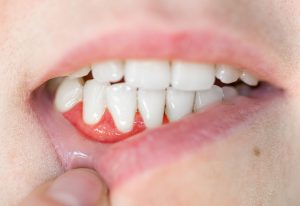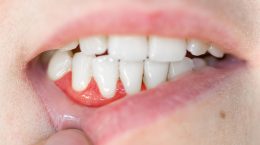Published on March 20, 2024
A diagnosis of periodontal disease may be reason to worry more about other linked systemic diseases and to take steps necessary to decrease the risk of those diseases while also caring for your oral health
Key Points
- Periodontal disease has been linked to an increased risk of over 57 other systemic diseases
- The easiest change to incorporate that would affect periodontal disease and the associated adverse health outcomes would be to increase vitamin D levels; in fact, vitamin D status was found to be a strong risk factor for periodontal disease and the multimorbidity outcomes
- Measuring levels of CRP, omega-3s, magnesium and vitamin D may give additional insight to how preventing and healing periodontal disease could be addressed for each individual, while also decreasing the risk of other linked diseases

Periodontitis is a common, severe gum infection that can lead to tooth loss, with more mild symptoms including swollen, red, and tender gums. Research continues to link periodontal disease with an increased risk of many other diseases – including cardiovascular disease, diabetes mellitus, and respiratory diseases, as well as adverse pregnancy outcomes, and many more. Shared modifiable risk factors are associated with each of these conditions, including low vitamin D levels, smoking, obesity, poor diet, and low levels of physical activity.
Periodontitis is Linked to 57+ Other Systemic Diseases!
This short video discusses several of the more than 57 diseases that are related to periodontal disease. An increased amount of these diseases are seen among patients who have gum disease, which is an indication that, with a diagnosis of periodontal disease, there may be reason to worry more about other potential diseases and to take steps necessary to decrease the risk of those as well as caring for your oral health.
Actions to Reduce the Risk of Periodontal and other Adverse Health Outcomes
 A review by Grant et al. 2023 outlines several actions that individuals with periodontal disease can take to help improve their periodontal health and decrease their risk of other adverse health outcomes. This video interview with two of the study’s authors, William B. Grant, PhD and Barbara van Amerongen, PhD, DDS, summarizes the findings and the importance of this paper.
A review by Grant et al. 2023 outlines several actions that individuals with periodontal disease can take to help improve their periodontal health and decrease their risk of other adverse health outcomes. This video interview with two of the study’s authors, William B. Grant, PhD and Barbara van Amerongen, PhD, DDS, summarizes the findings and the importance of this paper.
Watch the interview here or read the full transcript at vitamindwiki.com.
4 Measurements to Pay Attention to for Periodontal Disease Prevention and Diagnosis
Vitamin D Status is an Important Risk Factor
According to the authors of the paper above, the easiest change to incorporate that would affect periodontal disease and the associated adverse health outcomes would be to increase vitamin D levels. In fact, vitamin D status was found to be a strong risk factor for periodontal disease and the multimorbidity outcomes. A paper by Jagelavičienė et al. also found that the risk of gingivitis and chronic periodontitis decreased with sufficient intake of vitamin D, likely due to its roles in:
- immunomodulation
- anti-inflammation
- antiproliferative effects
- cell apoptosis
- bone metabolism
- alveolar bone resorption
- prevention of tooth loss
- increased antibacterial defenses of gingival epithelial cells
- decreased gingival inflammation
In addition, vitamin D was found to improve postoperative wound healing after periodontal surgery and is an important supplement used as prophylaxis in periodontology.
C-Reactive Protein (CRP)
High CRP levels could be indicative of periodontal disease. In fact, many studies looking at the relationship between periodontitis and CRP levels have found elevated CRP in those with chronic periodontitis. After reviewing the evidence, Bansal et al. concluded that “chronic periodontitis results in higher systemic levels of CRP” that could also result in increased risk of atherosclerotic inflammation and cardiovascular events. An increase in CRP levels can even indicate hidden disease that has not yet been diagnosed.
The CRP test blood spot test offered by GrassrootsHealth uses a high sensitivity assay, hs-CRP where “hs” means high sensitivity, to detect small elevations in CRP.
Omega-3s Help Prevent and Improve Measures of Periodontitis
Omega-3 fatty acids are known for their anti-inflammatory effects and have been shown to help reduce diseases related to chronic inflammation, including periodontitis. A systematic review by Chatterjee et al. analyzed the effects of the omega-3 fatty acids, including docosahexaenoic acid (DHA) and eicosapentanoic acid (EPA), on measures of periodontitis. The analysis looked at 8 separate studies that assessed pocket depth (PD, or the space between the gum and where the tooth attaches), clinical attachment level (CAL, another measure of gum attachment to the tooth), gingival index (GI, the amount of bleeding on gentle probing) and/or plaque index (PI, the amount of dental plaque visible) at 3 months and at 6 months of supplementation.
At 3 months, there was a significant effect of omega-3 supplementation on CAL and PD, with continued positive effects at 6 months. Several studies also found a significant improvement in GI at 6 months, especially when omega-3 supplements were given in combination with aspirin.
Also seen among the studies was
- a preventive effect of higher EPA and DHA serum levels on periodontal disease progression
- lower levels of inflammation among those taking omega-3 fatty acids, especially among those also taking aspirin
- improved periodontal health with long-term ingestion of omega-3 fatty acids
The authors conclude that “the use of omega-3 fatty acid supplements seems to have a positive effect on periodontal wound healing, especially in regards to the measurements for the attachment of the gums to the tooth.” Measuring your Omega-3 Index is one way you can make sure you’re getting enough of these important essential fatty acids.
Magnesium Deficiency Linked to Increased Risk of Periodontitis
Magnesium has several roles in regulating the inflammatory and immune responses, and a lack of magnesium has been linked to increased risk of chronic diseases including diabetes, metabolic syndrome, cancer, Alzheimer’s disease, and more.
Using NHANES data from 2013-2014, Li et al. looked at the correlation between magnesium intake (from diet and supplements) and periodontitis among 3,028 adults ages 30 years or older. The study found a 31% significantly decreased risk of periodontitis among those in the highest magnesium intake group compared to the lowest, along with a negative association between magnesium intake and periodontitis among all models of analysis (p<0.05). These findings led the authors to conclude that “dietary magnesium deficiency increases the prevalence of periodontitis.”
Up to 60% of the US population is estimated to be deficient in magnesium. Deficient magnesium levels can be due to insufficient magnesium in the diet, as well as problems with kidney function, alcoholism, and the use of diuretics and proton pump inhibitors. The dried blood spot magnesium test offered as part of the D*action project measures the amount of magnesium within whole blood, and is a better indicator of magnesium status than the serum magnesium test.
Measure Your Levels of the Above Today!
 Having and maintaining healthy vitamin D and other nutrient levels can help improve your health now and for your future. Choose which to measure, such as your vitamin D, omega-3s, and essential minerals including magnesium and zinc, by creating your custom home test kit today. Take steps to improve the status of each of these measurements to benefit your overall health. You can also track your own intakes, symptoms and results to see what works best for YOU.
Having and maintaining healthy vitamin D and other nutrient levels can help improve your health now and for your future. Choose which to measure, such as your vitamin D, omega-3s, and essential minerals including magnesium and zinc, by creating your custom home test kit today. Take steps to improve the status of each of these measurements to benefit your overall health. You can also track your own intakes, symptoms and results to see what works best for YOU.
Enroll and test your levels today, learn what steps to take to improve your status of vitamin D (see below) and other nutrients and blood markers, and take action! By enrolling in the GrassrootsHealth projects, you are not only contributing valuable information to everyone, you are also gaining knowledge about how you could improve your own health through measuring and tracking your nutrient status, and educating yourself on how to improve it.





